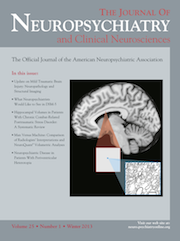Hippocampal Volumes in Patients With Chronic Combat-Related Posttraumatic Stress Disorder: A Systematic Review
Abstract
The authors and others have recently demonstrated that veterans with chronic combat-related PTSD (CR-PTSD) have a twofold increased risk of dementia. To understand this increased incidence, they performed a systematic review of the literature on neuroanatomical differences between veterans with chronic CR-PTSD and control subjects (22 included studies). The hippocampus was most commonly and consistently reported to differ between groups, thereby suggesting the hypothesis that PTSD is associated with smaller hippocampi, which increases the risk for dementia. However, an alternate hypothesis is that smaller hippocampal volumes are a preexisting risk factor for PTSD and dementia. Studies are clearly needed to differentiate between these important possibilities.



